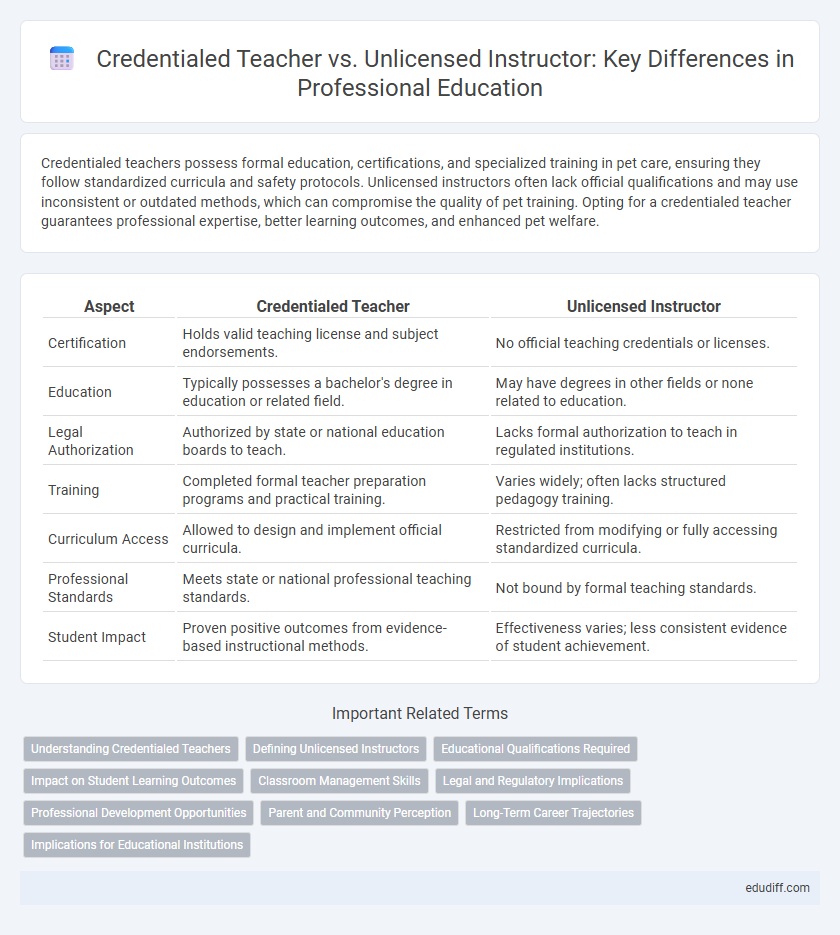Credentialed teachers possess formal education, certifications, and specialized training in pet care, ensuring they follow standardized curricula and safety protocols. Unlicensed instructors often lack official qualifications and may use inconsistent or outdated methods, which can compromise the quality of pet training. Opting for a credentialed teacher guarantees professional expertise, better learning outcomes, and enhanced pet welfare.
Table of Comparison
| Aspect | Credentialed Teacher | Unlicensed Instructor |
|---|---|---|
| Certification | Holds valid teaching license and subject endorsements. | No official teaching credentials or licenses. |
| Education | Typically possesses a bachelor's degree in education or related field. | May have degrees in other fields or none related to education. |
| Legal Authorization | Authorized by state or national education boards to teach. | Lacks formal authorization to teach in regulated institutions. |
| Training | Completed formal teacher preparation programs and practical training. | Varies widely; often lacks structured pedagogy training. |
| Curriculum Access | Allowed to design and implement official curricula. | Restricted from modifying or fully accessing standardized curricula. |
| Professional Standards | Meets state or national professional teaching standards. | Not bound by formal teaching standards. |
| Student Impact | Proven positive outcomes from evidence-based instructional methods. | Effectiveness varies; less consistent evidence of student achievement. |
Understanding Credentialed Teachers
Credentialed teachers possess state-approved certifications that validate their expertise in specific subject areas and adherence to rigorous educational standards. These credentials ensure they have completed formal teacher preparation programs, including student teaching experiences, which equip them with effective instructional strategies and classroom management skills. Schools rely on credentialed teachers to maintain high-quality education and comply with state regulations, distinguishing them from unlicensed instructors who lack formal certification and often have limited pedagogical training.
Defining Unlicensed Instructors
Unlicensed instructors are individuals who teach without formal certification or state-approved credentials typically required for teachers. These educators may possess subject expertise or practical experience but lack official licensing that verifies their pedagogical training and compliance with educational standards. Schools employing unlicensed instructors often do so to fill gaps in personnel, especially in specialized subjects or underserved areas.
Educational Qualifications Required
Credentialed teachers are required to hold state-issued teaching licenses that validate their completion of accredited education programs and successful passage of standardized exams. Unlicensed instructors often lack formal certification, typically relying on subject-matter expertise or alternative qualifications without fulfilling state credentialing criteria. Educational qualifications for credentialed teachers emphasize rigorous academic preparation, including bachelor's degrees in education and supervised student teaching experience.
Impact on Student Learning Outcomes
Credentialed teachers typically demonstrate higher effectiveness in improving student learning outcomes through their specialized training, certification, and adherence to educational standards. Unlicensed instructors may lack formal pedagogical knowledge and classroom management skills, potentially resulting in inconsistent student achievement and engagement. Research consistently links credentialed educators with enhanced student performance, especially in core subjects like math and reading.
Classroom Management Skills
Credentialed teachers demonstrate superior classroom management skills through formal training and adherence to state educational standards, enabling effective student engagement and discipline. Unlicensed instructors often lack standardized pedagogical strategies, which can lead to inconsistent classroom control and reduced learning outcomes. Mastery in classroom management correlates strongly with certified credentials, impacting overall educational quality and student success.
Legal and Regulatory Implications
Credentialed teachers comply with state certification requirements, ensuring legal authorization to deliver curriculum in public schools, while unlicensed instructors often lack such certification, potentially violating state education laws. The presence of a valid teaching license signifies adherence to regulatory standards, including background checks, subject-matter expertise, and ongoing professional development. Employing unlicensed instructors risks legal ramifications for educational institutions, including fines and loss of accreditation, emphasizing the critical importance of verified credentials in the teaching workforce.
Professional Development Opportunities
Credentialed teachers access a broader range of professional development opportunities, including specialized workshops, advanced certification programs, and leadership training endorsed by educational institutions. Unlicensed instructors often face limitations in eligibility for these programs, restricting their growth and advancement within the education sector. Continuous professional development for credentialed teachers enhances instructional skills, compliance with educational standards, and career progression.
Parent and Community Perception
Parents and community members often perceive credentialed teachers as more qualified due to their formal training, certification, and adherence to state education standards. Credentialed teachers are believed to provide a higher quality of instruction and better student outcomes, fostering trust and confidence within the community. In contrast, unlicensed instructors may face skepticism regarding their expertise and ability to meet diverse educational needs, impacting parental and community support.
Long-Term Career Trajectories
Credentialed teachers typically experience more stable long-term career trajectories due to formal certification requirements that enhance job security and eligibility for advanced roles such as curriculum specialist or educational administrator. Unlicensed instructors often face limited professional growth opportunities and lower salary prospects, with fewer pathways for advancement within traditional school systems. Over time, credentialed educators are more likely to benefit from continuous professional development, tenure, and leadership positions that contribute to sustained career success.
Implications for Educational Institutions
Credentialed teachers provide educational institutions with verified expertise and adherence to state certification standards, supporting curriculum integrity and student achievement. Unlicensed instructors, while potentially skilled, may pose compliance risks and affect institutional accreditation due to the lack of formal qualifications. Educational institutions must consider these implications carefully to maintain quality assurance and regulatory alignment.
Credentialed Teacher vs Unlicensed Instructor Infographic

 edudiff.com
edudiff.com